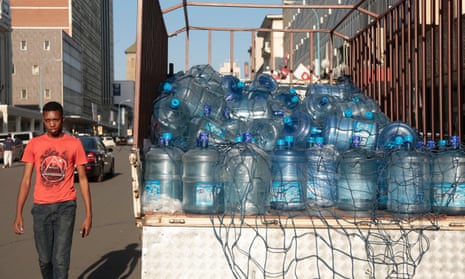Water being pumped to millions of residents in Zimbabwe’s capital city came from reservoirs contaminated by dangerous toxins, according to a report seen by the Guardian.
A study conducted by South African company Nanotech Water Solutions concluded that the health of 3 million Harare residents may be endangered by the provision of water containing toxins that can cause liver and central nervous system diseases.
The study, conducted last year, has been seen by the Guardian but has not been made public.
“The primary objective of the trial was to demonstrate the oxidative capacity of chlorine dioxide on the plant’s incoming and inherent algae … and its associated toxins, pathogenic (disease-causing) micro-organisms and other micro-contaminants,” said the report.
Oxidation is a chemical treatment process designed to remove organic and inorganic materials in water. The removal of algae and associated toxins, especially hepatotoxins (toxins that affect the liver) and neurotoxins (toxins that affect the central nervous system), is crucial to the production of safe drinking water.
The toxins, said the report, are found in the algae at Harare’s major water reservoirs, including the Chivero and Manyame lakes. The foul smell and brownish colour of water in Harare are associated with a plethora of algal species, the researchers added.
According to the US Environmental Protection Agency, harmful algae produce dangerous toxins in fresh or marine water. The agency warns people to keep away from from water that is green, scummy or smells bad.
News of the report has enraged local people, said Precious Shumba, founder and coordinator of the Harare Residents’ Trust.
“Residents have complained numerous times about the strong stench coming out of the water that the city of Harare is delivering to ratepayers,” she said.
“The water has visible impurities, which creates doubts and insecurities among consumers.”
Shumba said residents were living in fear of contracting diseases as a result of the dirty water, and no longer trusted the city’s supply.
“There is fear of falling sick with cholera, typhoid and other deadly diseases which might be caused by these dirty particles in the city water. The city has always defended the quality of their water, claiming that the particles are harmless, but no one really takes them seriously on this,” Shumba said.
Harare’s mayor, Herbert Gomba, has defended the city’s water quality, insisting it remains safe to drink.
“It’s safe, according to reports from our quality team,” he said.
“I am sure you are aware we are facing forex challenges and that the infrastructure is old and was never meant for the huge population we now serve. Again, we are owed a lot by our people, money which can be used to do more work if we are paid by all who consumed our water. We are working hard to pump more water through refurbishment of the infrastructure.”
Harare city council spends $3m (£2.3m) every month on chemicals intended to purify the water.
Poorer residents like Joyce Mutseyami, 40, who lives in the sleepy Harare suburb of Kambuzuma, are particularly affected by the crisis as they cannot afford to buy still water. Gone are the days when she felt she could drink straight from the tap.
This week, residents had no water for three days. Mutseyami was among many dashing out to their shared backyard taps, waiting in line to collect a bucketload of the muddy liquid that gives off a foul smell and a brownish froth. It was a typical scene in a city that is often without running water for long periods.
“I don’t have a choice [other] than to drink this water. I boil it before consumption because my children may contract diseases,” Mutseyami said.
“One day we will all wake up sick because you are never assured, even if you boil the water, that it is safe. We have petitioned the council before and even took samples of the water, but nothing has been done. It’s getting worse.”
With a baby strapped on her back, Talent Mupemhi, 30, waits impatiently for her turn to fetch water from a local borehole. She has no trust in the local tap water. Yet it was the use of unsafe boreholes and wells that probably led to Zimbabwe’s cholera outbreak in 2018.
Water brawls often erupt when people who dare to skip the line are caught by angry residents. Some even take advantage of the residents’ desperation to charge for borehole water.
Mupemhi has waited for two hours. She does this every day.
“I endure long queues every day to fetch water because I have no choice, tap water is unsafe. I only use it for washing,” said Muphemhi.
“I was once hospitalised after drinking tap water, it is dirty and has a foul smell. Surely people are dying slowly because they do not know what this water contains. There is sewage flowing around, slipping into drinking water. Do you think we are safe?”
